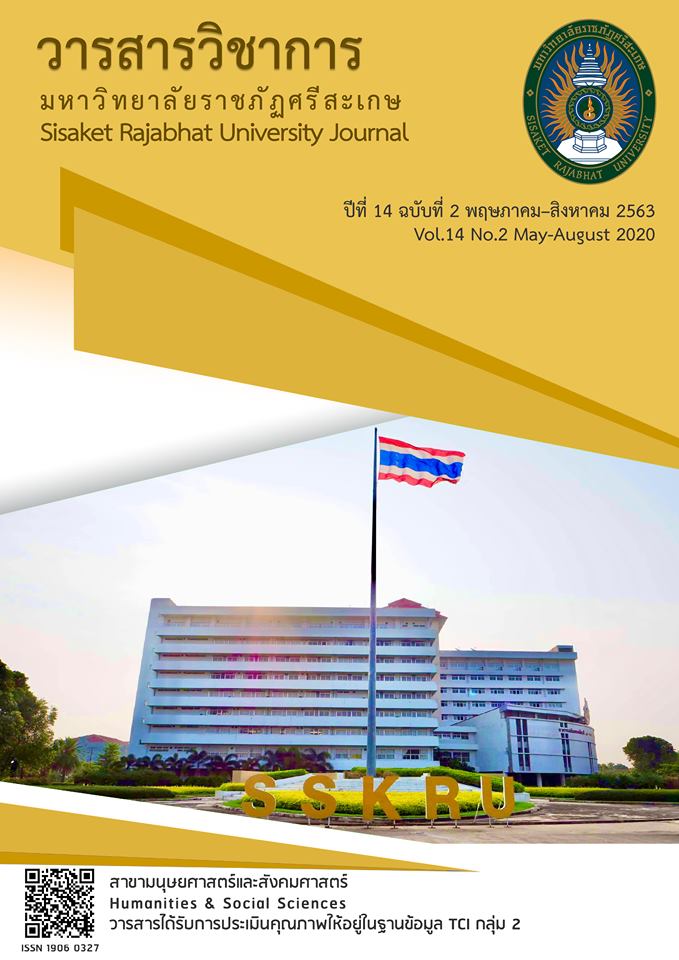The Engagement Pattern and Challenges of International Students in a Thai Higher Educational Context
Main Article Content
บทคัดย่อ
This research aims to explore the international student engagement pattern and challenges for international students on general education courses at Prince of Songkla University, Phuket Campus, where the majority of students are Thai. The data were collected with reflective questionnaires, camp diaries and in-depth interviews with international students enrolling for two courses in Semester 2, Academic Year 2019, namely 905-101 New Consciousness and 905-102 Happy and Peaceful Life. The study revealed their engagement pattern in seven aspects; 1) emotional engagement 2. physical engagement 3) behavioral engagement 4) social engagement 5) cultural engagement 6) cognitive engagement and 7) meta-cognitive engagement. In terms of challenges, they identified language difficulties even though this was not an obstacle when mixing with Thai students or participating in course activities.
Article Details
1. เนื้อหาและข้อมูลในบทความที่ลงตีพิมพ์ในวารสารวิชาการมหาวิทยาลัยราชภัฏศรีสะเกษ ถือเป็นข้อคิดเห็นและความรับผิดชอบของผู้เขียนบทความโดยตรง ซึ่งกองบรรณาธิการวารสาร ไม่จำเป็นต้องเห็นด้วย หรือร่วมรับผิดชอบใด ๆ
2. บทความ ข้อมูล เนื้อหา รูปภาพ ฯลฯ ที่ได้รับการตีพิมพ์ในวารสารวิชาการมหาวิทยาลัยราชภัฏศรีสะเกษ กองบรรณาธิการไม่สงวนสิทธิ์ในการคัดลอกบทความเพื่อการศึกษา แต่ให้อ้างอิงแหล่งที่มาให้ครบถ้วนสมบูรณ์
เอกสารอ้างอิง
615-631.
Berry, J. W. (2005). Acculturation: Living successfully in two cultures. International Journal of Intercultural Relations, 29(6). doi: 10.1016/j.ijintrel.2005.07.013
Calhoun, J. F., & Acocella, J. R. (1983). Psychology of adjustment and human relationships (2nd ed.): Random House.
Dechakup, P. (2001). Student-centered teaching and learning style: concepts, methods and techniques in teaching. Bangkok: the master group management.
Fredericks, J. A., Blumenfeld, P. C. & Paris, A. H. (2004). School engagement: potential of the concept, state of the evidence. Review of Educational Research,
74, 59-109.
Gebhard, J. G. (2012). International students’ adjustment problems and behaviors. Journal of International Students, 2(2), 184-193.
Indiana University (2018). National survey of student engagement. USA: Indiana University.
Khieowan, N. (2017). Factors contributing to adjustment of migrants from Myanmar: A case study in Phuket. Ph.D thesis, Universiti Sains Malaysia, Malaysia.
Lai, E. (2011). ‘Metacognition: A literature review’, Pearson’s Research Review. Retrieved 27 January, 2016, from https://moodle.elac.edu
Miller, W.R., Yahne, C.E., & Rhodes, J.M. (1990). Adjustment: the psychology of change. Englewood cliffs, New Jersey: Prentice-hall, Inc.
Panich, V. (2012). Creating learning for the 21st century learners. Bankok: Sonsri-sawadwaong foundation.
Schwartz, S. J., Unger, J. B., Zamboanga, B. L., & Szapocznik, J. (2013). Rethinking the concept of acculturation: implications for theory and research. American Psychologist, 65(4), 237–251. doi: 10.1037/a0019330
Valtonen, K. (2008). Social work and migration: immigrant and refugee settlement and integration. Surrey, England: MPG Books.


